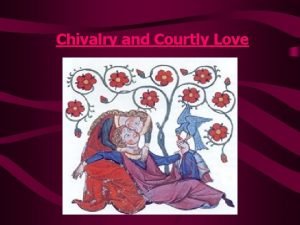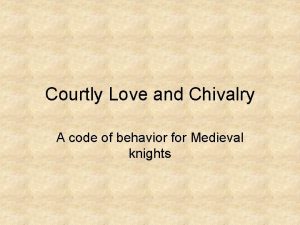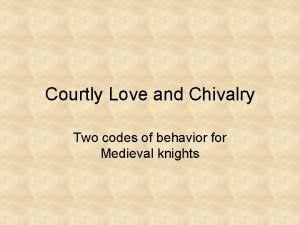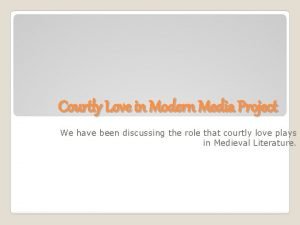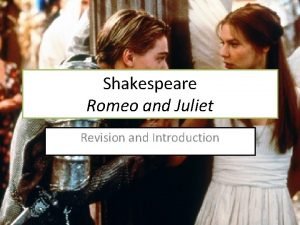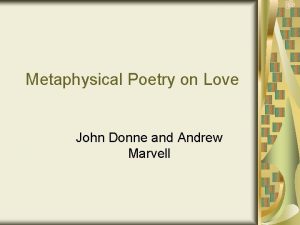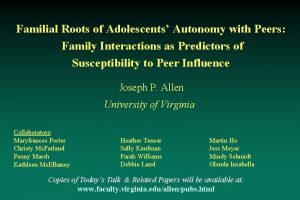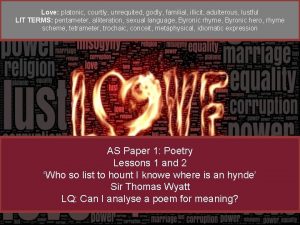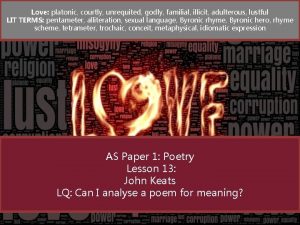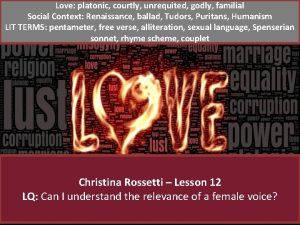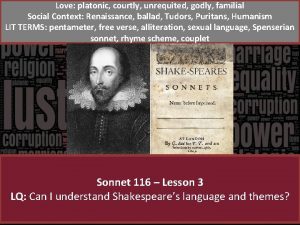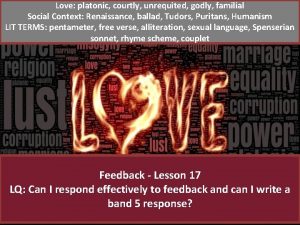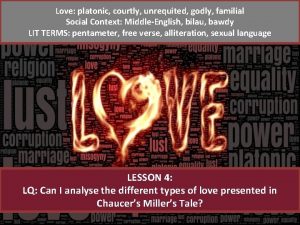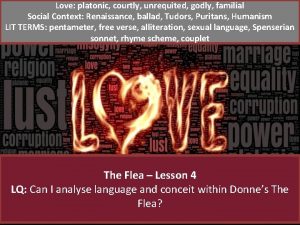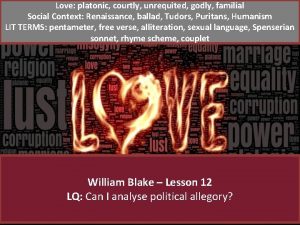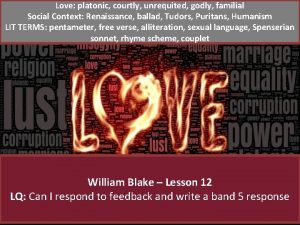Love platonic courtly unrequited godly familial illicit adulterous










- Slides: 10

Love: platonic, courtly, unrequited, godly, familial, illicit, adulterous, lustful LIT TERMS: pentameter, alliteration, sexual language, Byronic rhyme, Byronic hero, rhyme scheme, tetrameter, trochaic, conceit, metaphysical, idiomatic expression AS Paper 1: Poetry Lesson 7 ‘The Scrutiny’ Richard Lovelace LQ: Can I analyse a poem for meaning and make accurate links to historical context?

Love: platonic, courtly, unrequited, godly, familial, illicit, adulterous, lustful LIT TERMS: pentameter, alliteration, sexual language, Byronic rhyme, Byronic hero, rhyme scheme, tetrameter, trochaic, conceit, metaphysical, idiomatic expression Outstanding progress: well-chosen quotations, sophisticated language used, analysis of range of literary device, effect on reader argued with perceptive points made, alternative interpretations revealed, developed consideration of social and historical context Excellent progress: well-chosen quotations, analysis of range of literary devices, effect on reader discussed, alternative interpretations considered and social context mentioned Good progress: two quotations, comment on literary device, alternative interpretation offered and social context mentioned LQ: Can I analyse a poem for meaning?

Love: platonic, courtly, unrequited, godly, familial, illicit, adulterous, lustful LIT TERMS: pentameter, alliteration, sexual language, Byronic rhyme, Byronic hero, rhyme scheme, tetrameter, trochaic, conceit, metaphysical, idiomatic expression What do you know about Charles the 1 st? What kind of ruler to know him to have been? Charles I was monarch of the three kingdoms of England, Scotland, and Ireland from 27 March 1625 until his execution in 1649. Charles was the second son of King James VI of Scotland, but after his father inherited the English throne in 1603, he moved to England, where he spent much of the rest of his life. After his succession, Charles quarrelled with the Parliament of England, which sought to curb his royal prerogative. Charles believed in the divine right of kings and thought he could govern according to his own conscience. Many of his subjects opposed his policies, in particular the levying of taxes without parliamentary consent, and perceived his actions as those of a tyrannical absolute monarch. His religious policies, coupled with his marriage to a Roman Catholic, generated the antipathy and mistrust of reformed groups such as the Puritans and Calvinists, who thought his views too Catholic. He supported high church ecclesiastics, such as Richard Montagu and William Laud, and failed to aid Protestant forces successfully during the Thirty Years' War. His attempts to force the Church of Scotland to adopt high Anglican practices led to the Bishops' Wars, strengthened the position of the English and Scottish parliaments and helped precipitate his own downfall. From 1642, Charles fought the armies of the English and Scottish parliaments in the English Civil War. After his defeat in 1645, he surrendered to a Scottish force that eventually handed him over to the English Parliament. Charles refused to accept his captors' demands for a constitutional monarchy, and temporarily escaped captivity in November 1647. Re-imprisoned on the Isle of Wight, Charles forged an alliance with Scotland, but by the end of 1648 Oliver Cromwell's New Model Army had consolidated its control over England. Charles was tried, convicted, and executed LQ: Can I analyse a poem for meaning?

Love: platonic, courtly, unrequited, godly, familial, illicit, adulterous, lustful LIT TERMS: pentameter, alliteration, sexual language, Byronic rhyme, Byronic hero, rhyme scheme, tetrameter, trochaic, conceit, metaphysical, idiomatic expression Richard Lovelace was a ‘Cavalier Poet’. What do you understand that term to mean? Cavalier Poets is a broad description of a school of English poets of the 17 th century, who came from the classes that supported King Charles I during the English Civil War. Charles, a connoisseur of the fine arts, supported poets who created the art he craved. These poets in turn grouped themselves with the King and his service, thus becoming Cavalier Poets. A cavalier was traditionally a mounted soldier or knight, but when the term was applied to those who supported Charles it was meant to portray them as roistering gallants. The term was thus meant to belittle and insult. However, it became the term applied to those who supported Charles. They were separate in their lifestyle and divided on religion from the Roundheads, who supported Parliament. LQ: Can I analyse a poem for meaning?

Love: platonic, courtly, unrequited, godly, familial, illicit, adulterous, lustful LIT TERMS: pentameter, alliteration, sexual language, Byronic rhyme, Byronic hero, rhyme scheme, tetrameter, trochaic, conceit, metaphysical, idiomatic expression Characteristics of Cavalier Poetry Instead of tackling issues like religion, philosophy, and the arts, cavalier poetry aims to express the joy and simple gratification of celebratory things much livelier than the traditional works of their predecessors. The intent of their works was often to promote the crown (particularly Charles I), and cavalier poets spoke outwardly against the Roundheads who supported the rebellion of Parliament against the crown. The Cavalier Poets strove to create poetry where both pleasure and virtue thrived. They were rich in reference to the ancients as well as pleasing. Commonly held traits certainly exist in Cavalier poetry in that most poems “celebrate beauty, love, nature, sensuality, drinking, good fellowship, honour, and social life. ” In many ways, this poetry embodies an attitude that mirrors “carpe diem. ” Cavalier poets certainly wrote to promote Loyalist principles in favour of the crown, but their themes ran deeper than that. Cavalier poets wrote in a way that promoted seizing the day and the opportunities presented to them and their kinsmen. They wanted to revel in society and come to be the best that they possibly could within the bounds of that society. This endorsement of living life to the fullest, for Cavalier writers, often included gaining material wealth and having sex with women. These themes contributed to the triumphant and boisterous tone and attitude of the poetry. Platonic Love was also another characteristic of Cavalier poetry, where the man would show his divine love to a woman, where she would be worshipped as a creature of perfection. As such it was common to hear praise of womanly virtues as though they were divine. Cavalier poetry is closely linked to the Royalist cause in that the main intent of their poetry was to glorify the crown. In this way, Cavalier poetry is often grouped in a political category of poetry. Once the conflict began between the monarchy and the rebellious parliament, the content of the poetry became much more specifically aimed at upholding Royalist ideals. These men were considered by many to write in a nostalgic tone in that their work promoted the principles and LQ: Can I analyse a poem for meaning?

Love: platonic, courtly, unrequited, godly, familial, illicit, adulterous, lustful LIT TERMS: pentameter, alliteration, sexual language, Byronic rhyme, Byronic hero, rhyme scheme, tetrameter, trochaic, conceit, metaphysical, idiomatic expression Read the poem as a class. Based on what you know about the poet, what do you think this poem is about? What do you think the speaker’s attitude to love is? How would you articulate a feminist interpretation of the poem? Ext: Can you make links to any of the other poems we have looked at? LQ: Can I analyse a poem for meaning?

Love: platonic, courtly, unrequited, godly, familial, illicit, adulterous, lustful LIT TERMS: pentameter, alliteration, sexual language, Byronic rhyme, Byronic hero, rhyme scheme, tetrameter, trochaic, conceit, metaphysical, idiomatic expression Group work. In three groups, analyse the poem for the following: Language Structure Imagery Outstanding progress: well-chosen quotations, sophisticated language used, literary devices analysed, effect on reader argued with perceptive points made, alternative interpretations revealed, developed consideration of social and historical context progress: well-chosen Excellent quotations, literary devices analysed, effect on reader discussed, alternative interpretations considered How are they used to and social context mentioned reinforce your ideas as Good progress: two quotations, to the speaker’s comment on literary device, attitude to love? alternative interpretation offered Ext: Can you comment on social context mentioned LQ: form? Can I analyseand a poem for meaning? the poem’s

Love: platonic, courtly, unrequited, godly, familial, illicit, adulterous, lustful LIT TERMS: pentameter, alliteration, sexual language, Byronic rhyme, Byronic hero, rhyme scheme, tetrameter, trochaic, conceit, metaphysical, idiomatic expression Using the information that you have learned this lesson, can you plan a response to the following question: What is the speaker's attitude to love in Ext: Have you 'The referred in Lovelace's detail to the poetic Scrutiny' devices being used? LQ: Can I Outstanding progress: well-chosen quotations, sophisticated language used, literary devices analysed, effect on reader argued with perceptive points made, alternative interpretations revealed, developed consideration of social and historical context Excellent progress: well-chosen quotations, literary devices analysed, effect on reader discussed, alternative interpretations considered and social context mentioned Good progress: two quotations, comment on literary device, alternative interpretation offered analyse a poem meaning? social context for mentioned

Love: platonic, courtly, unrequited, godly, familial, illicit, adulterous, lustful LIT TERMS: pentameter, alliteration, sexual language, Byronic rhyme, Byronic hero, rhyme scheme, tetrameter, trochaic, conceit, metaphysical, idiomatic expression Feedback. Add to your plan as we feedback. Does your plan cover all of the Assessment Objectives? Ext: Have you referred in detail to the poetic devices being used? LQ: Can I Outstanding progress: well-chosen quotations, sophisticated language used, literary devices analysed, effect on reader argued with perceptive points made, alternative interpretations revealed, developed consideration of social and historical context Excellent progress: well-chosen quotations, literary devices analysed, effect on reader discussed, alternative interpretations considered and social context mentioned Good progress: two quotations, comment on literary device, alternative interpretation offered analyse a poem meaning? social context for mentioned

Love: platonic, courtly, unrequited, godly, familial, illicit, adulterous, lustful LIT TERMS: pentameter, alliteration, sexual language, Byronic rhyme, Byronic hero, rhyme scheme, tetrameter, trochaic, conceit, metaphysical, idiomatic expression Outstanding progress: well-chosen quotations, sophisticated language used, analysis of range of literary device, effect on reader argued with perceptive points made, alternative interpretations revealed, developed consideration of social and historical context Excellent progress: well-chosen quotations, analysis of range of literary devices, effect on reader discussed, alternative interpretations considered and social context mentioned Good progress: two quotations, comment on literary device, alternative interpretation offered and social context mentioned LQ: Can I analyse a poem for meaning?
 Courtly love vs modern love
Courtly love vs modern love Courtly love rules
Courtly love rules Chivalric codes
Chivalric codes Code of courtly love
Code of courtly love Courtly love arthurian legend
Courtly love arthurian legend Courtly love in modern movies
Courtly love in modern movies Historical context of romeo and juliet
Historical context of romeo and juliet Introduction of john donne
Introduction of john donne Love love jesus is love god greatest gift lyrics
Love love jesus is love god greatest gift lyrics Familial hypocalciuric hypercalcemia
Familial hypocalciuric hypercalcemia Familial roots
Familial roots

